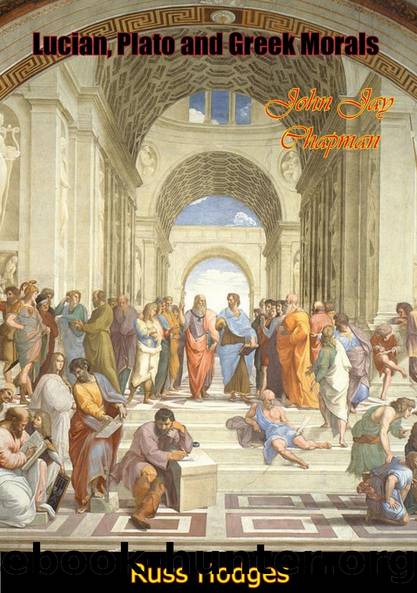Lucian, Plato and Greek Morals by John Jay Chapman

Author:John Jay Chapman [Chapman, John Jay]
Language: eng
Format: epub
ISBN: 9781787208414
Barnesnoble:
Publisher: Muriwai Books
Published: 2017-01-12T00:00:00+00:00
I am not familiar with the history of science, and I should like to ask those who know, whether there was any other thinker in ancient times who perceived that geometry was based on the same sort of artificial assumptions as theology or ethics. In the times that followed him, Lucian was supposed to have shown ignorance of geometry, and I see the charge repeated in an American school edition. I understand that it was not till the middle of the Nineteenth Century that geometers began to doubt the finality of that Euclidian geometry which has been so completely abolished in the Twentieth. Lucian had seen at a glance that the whole structure of Euclid was baseless, and he gives the true reasons for his discovery in the sentence quoted above. He has, as a matter of fact, given the answer to the favorite Greek riddle of Achilles and the Turtle. The answer is that there is in nature no such thing as a point.
Mathematics are included in Lucianâs destructive criticism. There is no such thing as One in natureâunless it be the Universe, and in that case there is no such thing as Two. In other words, there is no discoverable relation between manâs reason and the reality which lies hid behind natureâs phenomena. That Lucian has seen this truth at a glance, and has pushed on past the blind-spot toward subjects that Reason can grapple withâsubjects that are of practical and permanent importance, ideas that excite enthusiasmâthis is the merit of Lucian.
If one reflects a little about human nature and human history, one cannot wonder that a man whose mind was so constantly occupied in destroying popular illusions should have been regarded as an enemy to mankind by the classes whose beliefs, prejudices, and interests he assailed. To the Christian Church, Lucian was a prize infidel. Not only toward the Church, but toward every established certitude, class, clique, or potency he acted as a dissolvent. Even modern and sympathetic editors can hardly let him go without suggesting that he is, after all, too purely destructive, too negative. They ask what does Lucian leave behind? Well, âBy their fruits ye shall know them.â Lucian, after sleeping for a thousand years in Byzantium, came to Western Europe and became a wholesome, vivifying influence upon the minds and temperaments of men. He can be traced in all the modern literature of Europe. He was and is a personal stimulant upon the individual minds that are touched by his writings. He was an awakener, an inspirer. His works, which looked like a mere magazine of explosives, are seen in their results to have been a pod filled with seeds, freighted with regenerative and spontaneous power. The spirit in which a man works is what counts in the end. Had Lucian been morose and cynical, had he even been gay and cynical, like Voltaire, his influence would not have struck so deep. But he is not cynical. He is buoyant, hearty, manly, clear as a bell and staunch as a ploughman; and it is this part of him that survives through the ages.
Download
This site does not store any files on its server. We only index and link to content provided by other sites. Please contact the content providers to delete copyright contents if any and email us, we'll remove relevant links or contents immediately.
The Daily Stoic by Holiday Ryan & Hanselman Stephen(3304)
The Fate of Rome: Climate, Disease, and the End of an Empire (The Princeton History of the Ancient World) by Kyle Harper(3056)
People of the Earth: An Introduction to World Prehistory by Dr. Brian Fagan & Nadia Durrani(2733)
Ancient Worlds by Michael Scott(2682)
Babylon's Ark by Lawrence Anthony(2673)
The Daily Stoic by Ryan Holiday & Stephen Hanselman(2572)
Foreign Devils on the Silk Road: The Search for the Lost Treasures of Central Asia by Peter Hopkirk(2463)
India's Ancient Past by R.S. Sharma(2451)
MOSES THE EGYPTIAN by Jan Assmann(2412)
The Complete Dead Sea Scrolls in English (7th Edition) (Penguin Classics) by Geza Vermes(2277)
The Earth Chronicles Handbook by Zecharia Sitchin(2227)
Lost Technologies of Ancient Egypt by Christopher Dunn(2223)
24 Hours in Ancient Rome by Philip Matyszak(2078)
Alexander the Great by Philip Freeman(2064)
Aztec by Gary Jennings(2023)
The Nine Waves of Creation by Carl Johan Calleman(1915)
Curse Tablets and Binding Spells from the Ancient World by Gager John G.;(1860)
Before Atlantis by Frank Joseph(1849)
Earthmare: The Lost Book of Wars by Cergat(1824)
